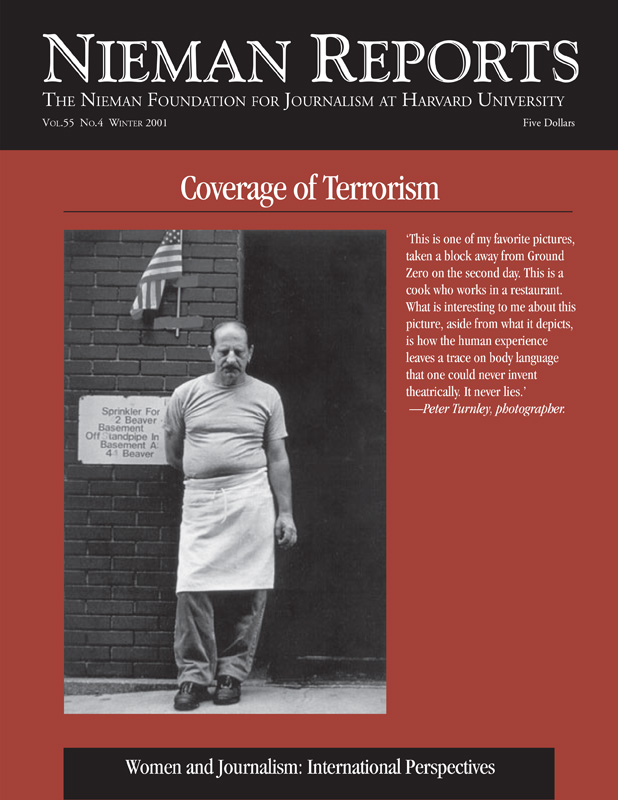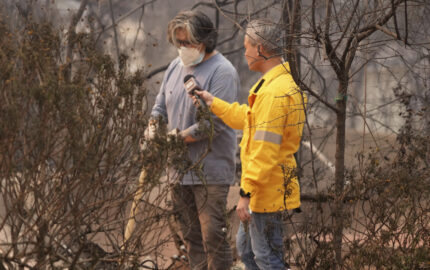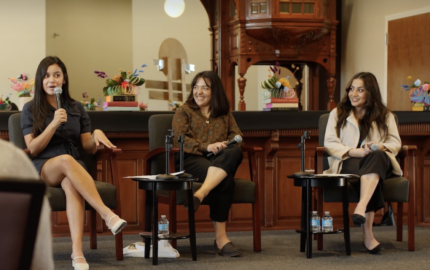
Coverage of Terrorism
Through the night of September 11, 2001, photographer Peter Turnley took refuge in a second-floor office in a clothing store, its windows blown out by the force of the attack on the World Trade Center. As he tried to absorb what he was seeing, he documented the devastation. At dawn, he moved close to the site and fastened his journalistic eye on faces whose expressions evoke our feelings of loss. From covering war, Turnley knew that “the most important pictures…are after the battle, when one sees the human impact.”
I once asked the late Scotty Reston, the legendary New York Times man, if there was any story he regretted printing. Without hesitating he spoke of a time during World War II when he violated the censorship code and reported that a Nazi submarine had seriously damaged a British cruiser. “I think that was unethical,” Reston reflected. “That was a case where my fastball was better than my control. I’d like to take that one back.”
Reston’s remorse confirms the conventional wisdom that reporters in times of war often find themselves torn between the instincts of a journalist and the duties of a citizen. Silence and forbearance do not come naturally to most reporters. Neither does giving government carte blanche in determining what can and cannot be reported. The problem today is even more complicated both by advances in telecommunications and by a government that habitually abuses the stamp of secrecy.
Government would have us believe that secrecy and national security are Siamese twins that share a common heart. In truth, secrecy, taken to excess, poses its own dire threat to national security. It creates fear and distrust, allows rumor to fill the void of information, disenfranchises the public from the sacrifices asked of it, and ultimately plays squarely into the hands of those who wish us ill. It is precisely in times of such crises that reporters should be wariest of government invocations of secrecy.
Today that secrecy is epidemic, by one count (that of the federal Information Security Oversight Office) growing at a rate of more than eight million new secrets a year. Deferring to the Pentagon, the White House or Central Intelligence Agency (CIA) to decide what is fit to print would itself be a grave abrogation of responsibilities, as damaging to national security as any violation of wartime censorship. Time and again government has demonstrated its willingness to invoke secrecy to mask failure and impotence, to minimize losses, and to exaggerate gains. Its lofty appeals to patriotism often conceal baser motives—not the safety of troops or ships or the homeland, but the management of news. Left to its own devices, the Pentagon and CIA would be only too happy to choreograph and script the coverage of the current conflict. But as every reporter knows, nothing resists such efforts like a “good war.”
It was William Tecumseh Sherman, commanding general of the Army in 1876, who advised an ambitious general setting out in a punitive campaign against the Sioux, “to be prudent, not to take along any newspapermen, who always make mischief.” The headstrong general ignored Sherman’s advice. His name was George Armstrong Custer. The battle was the Little Big Horn. The lone civilian casualty of that slaughter was the newspaperman who accompanied him.
The current war against terrorism brings old conflicts into high relief. In an age of advanced technology, when Predator drones prowl remote landscapes, when satellites gather reconnaissance, and cruise missiles and smart bombs lead the attack, the journalist often finds himself or herself profoundly marginalized, remote from the action—and ever more at the mercy of Pentagon briefers. Emboldened by its successes in the Gulf War, the Pentagon now holds an even tighter leash on the news. Much video footage comes not from independent camera crews, but from the eyes of weapons handpicked for theatricality. In such a war there are few if any Ernie Pyles sending back dispatches from the front. Indeed, there is scarcely a front at all. Not only are our enemies’ whereabouts unknown, but also sometimes even their identities. There are no flags to be raised over Suribachi—just one Pork Chop Hill after another. Neither Kabul nor Osama bin Laden are the prize in any final sense.
The more amorphous and murky the military goals, the more government can control information and propaganda to define victory. In the absence of clear objectives, it is easy, operating behind the curtain of secrecy, to conceal setbacks and pronounce progress. In the early going, the government discretely let it be known that numbers of Taliban warriors were defecting to the Northern Alliance or deserting from lack of spirit. The reality is otherwise. There were no material defections at the times of those reports. Later there were government leaks suggesting that Pashtun leaders in the south of Afghanistan were fomenting counterinsurgencies against the Taliban. These too appear to be just wistful notes sounded in an otherwise bleak landscape, hopes floated out there by those practiced in the art of psychological warfare and deception. Here we were on familiar ground. The only leaks that offend the generals are those that contradict them.
Today, it is not only distance and technology that conspire to put journalists at a disadvantage. It is also the smothering use of secrecy that obstructs the gathering of news. Just how far the government is willing to go to keep unsettling truths from the public was illustrated at the outset of the current campaign. Not long after CIA briefers met with a select audience of Congressional members, news leaked that they had been told there was a 100 percent chance terrorists would again strike the United States. Now if this is not information to which the American public is entitled, what is?
But the response to that leak was President Bush’s threat to limit the members of Congress given access to classified information. Such obsessive restrictions on information may help explain why Americans were blindsided by the September 11 events. Threat assessments of the intelligence community have long been deemed too unsettling to share with the public.
The issue is often not one of secrecy but of control. It is no coincidence that in World War I the same office that oversaw press censorship also oversaw propaganda efforts. The British journalist Phillip Knightly records that in World War II, a government censor was asked what he would tell the American people. His response: “I’d tell them nothing till it was over and then I’d tell them who won.”
In World War II, censorship often took ludicrous twists. Announcers covering baseball games were not even to report that the game was halted because of rain. There are of course legitimate occasions for secrecy. In times like these of heightened vulnerability, real-time troop deployments, pending operations, and “sources and methods” of intelligence gathering are all widely accepted by reporters as legitimately sensitive areas. The generals always argue for more secrets, the reporters for fewer. In World War I, the military came up with a list of more than 100 kinds of secrets the press was to stay away from. The list was whittled down to a scant 18 and printed on a six-by-12-inch card that was handed out to every editor and city desk in the nation. Compliance was voluntary. Then as now, secrets seeped out on their own. Shipping news was a no-no, though arrivals and departures were posted in every hotel lobby. Construction of new defense factories was to be ignored, though they occasioned banquets by the local Chamber of Commerce.
“Was there any other answer than secrecy at the source?” asked George Creel, the journalist who served in World War I as a kind of national censor as chairman of the Committee on Public Information. “If such information came to the ears of a reporter, most certainly it could be learned by any spy worth his pay.” Reflecting years later, Creel noted “In 1917, fortunately for us, the radio was not a problem.” In the age of the Internet, there is no delay upon which the reporter can draw comfort or defense for reporting genuinely security-sensitive materials. All reporting today is real time.
But many of the most sensitive secrets are themselves rarely newsworthy. It is the outcomes of troop deployments and the fruits of that intelligence-gathering that interest the public. The wider threat to national security comes not from reporters ignoring appeals to discretion or breaching formal censorship codes like those faced by Scotty Reston. Rather it comes from the government’s wholesale and wanton overclassification of information. Ironically, it is that which undermines the government’s capacity to conceal those bone fide secrets whose disclosure might actually damage national security.
Today, no one has lower regard for secrecy than those in government who actually wield the stamp of classification. They know from experience that it is used more often than not to lend a certain cachet to documents and that, without that stamp, memos and correspondence would be lost or ignored in the tsunami of paperwork that engulfs all bureaucracies, particularly that of the defense and intelligence communities. It is why former CIA Director John Deutch felt comfortable putting such sensitive operational materials on his unsecured home computer. Such disregard is the natural byproduct of obsessive secrecy. Abuse of secrecy breeds contempt for the system. It is like inflation. The more of it there is, the less it is valued.
This is a lesson lawmakers refuse to learn. Instead, their knee-jerk reaction is to respond to each leak with the threat of tighter strictures. While the CIA frets about press leaks or bemoans the aggressiveness of this or that reporter, the next Kim Philby or Aldrich Ames may already be plotting to milk the system. The keepers of secrets have always had trouble distinguishing between contretemps and treachery. In the end, they worry more about safeguarding secrets than security itself. “If we guard our toothbrushes and diamonds with equal zeal, we will probably lose fewer toothbrushes and more diamonds,” observed former national security advisor McGeorge Bundy.
Much of the tension we see today between disclosure and secrecy is familiar. Foster Hailey covered the war in the Pacific in World War II for The New York Times. In 1945 he wrote, “There have been some correspondents who were easily discouraged in their fights with the censor and the gold braid and contented themselves with writing pretty stories about generals and admirals and movie heroes who happened to be wearing uniforms. Or they were content to sit around the rear bases and write only what the public relations officer brought around to them.”
Today, it is less a matter of contentment than containment. But then as now we journalists have less to fear from the censor than from our own natural inclination to identify with and further the interests of our fellow citizens. It is not our role to help maintain the fighting spirit, to cushion the blows, or airbrush reality. We serve our country best when we report objectively and dispassionately, not as citizens of but one nation, but as stateless chroniclers promoting no agenda and serving no purpose but to inform. “In a free country,” wrote the late E.B. White, “it is the duty of writers to pay no attention to duty.” That is a particularly stern commandment, one that requires a near-absolute faith in the sanctity of information and the maturity of our nation’s leaders and citizenry to put that information to good use.
“Loose lips sink ships,” it is said. But sealed lips may suffocate entire democracies. Reporters have no taste for putting their fellow citizens at risk or compromising national security. Where a story may put Americans in peril, the rule remains: “When in doubt, leave it out.” But, among the millions and millions of secrets in this war against terrorism, there may be but one ultimate secret that our government would least like the American public or its enemies to know. That secret, I fear, is that they are in possession of no secret so valuable or insightful that it holds the promise of an end to our vulnerability.
Ted Gup is author of “The Book of Honor: Secret Lives and Deaths of CIA Operatives” and is professor of journalism at Case Western Reserve University in Cleveland. He has received the George Polk Award, The Worth Bingham Prize, The Gerald Loeb Award, and the 2000 Investigative Reporters and Editors Book Prize.
Reston’s remorse confirms the conventional wisdom that reporters in times of war often find themselves torn between the instincts of a journalist and the duties of a citizen. Silence and forbearance do not come naturally to most reporters. Neither does giving government carte blanche in determining what can and cannot be reported. The problem today is even more complicated both by advances in telecommunications and by a government that habitually abuses the stamp of secrecy.
Government would have us believe that secrecy and national security are Siamese twins that share a common heart. In truth, secrecy, taken to excess, poses its own dire threat to national security. It creates fear and distrust, allows rumor to fill the void of information, disenfranchises the public from the sacrifices asked of it, and ultimately plays squarely into the hands of those who wish us ill. It is precisely in times of such crises that reporters should be wariest of government invocations of secrecy.
Today that secrecy is epidemic, by one count (that of the federal Information Security Oversight Office) growing at a rate of more than eight million new secrets a year. Deferring to the Pentagon, the White House or Central Intelligence Agency (CIA) to decide what is fit to print would itself be a grave abrogation of responsibilities, as damaging to national security as any violation of wartime censorship. Time and again government has demonstrated its willingness to invoke secrecy to mask failure and impotence, to minimize losses, and to exaggerate gains. Its lofty appeals to patriotism often conceal baser motives—not the safety of troops or ships or the homeland, but the management of news. Left to its own devices, the Pentagon and CIA would be only too happy to choreograph and script the coverage of the current conflict. But as every reporter knows, nothing resists such efforts like a “good war.”
It was William Tecumseh Sherman, commanding general of the Army in 1876, who advised an ambitious general setting out in a punitive campaign against the Sioux, “to be prudent, not to take along any newspapermen, who always make mischief.” The headstrong general ignored Sherman’s advice. His name was George Armstrong Custer. The battle was the Little Big Horn. The lone civilian casualty of that slaughter was the newspaperman who accompanied him.
The current war against terrorism brings old conflicts into high relief. In an age of advanced technology, when Predator drones prowl remote landscapes, when satellites gather reconnaissance, and cruise missiles and smart bombs lead the attack, the journalist often finds himself or herself profoundly marginalized, remote from the action—and ever more at the mercy of Pentagon briefers. Emboldened by its successes in the Gulf War, the Pentagon now holds an even tighter leash on the news. Much video footage comes not from independent camera crews, but from the eyes of weapons handpicked for theatricality. In such a war there are few if any Ernie Pyles sending back dispatches from the front. Indeed, there is scarcely a front at all. Not only are our enemies’ whereabouts unknown, but also sometimes even their identities. There are no flags to be raised over Suribachi—just one Pork Chop Hill after another. Neither Kabul nor Osama bin Laden are the prize in any final sense.
The more amorphous and murky the military goals, the more government can control information and propaganda to define victory. In the absence of clear objectives, it is easy, operating behind the curtain of secrecy, to conceal setbacks and pronounce progress. In the early going, the government discretely let it be known that numbers of Taliban warriors were defecting to the Northern Alliance or deserting from lack of spirit. The reality is otherwise. There were no material defections at the times of those reports. Later there were government leaks suggesting that Pashtun leaders in the south of Afghanistan were fomenting counterinsurgencies against the Taliban. These too appear to be just wistful notes sounded in an otherwise bleak landscape, hopes floated out there by those practiced in the art of psychological warfare and deception. Here we were on familiar ground. The only leaks that offend the generals are those that contradict them.
Today, it is not only distance and technology that conspire to put journalists at a disadvantage. It is also the smothering use of secrecy that obstructs the gathering of news. Just how far the government is willing to go to keep unsettling truths from the public was illustrated at the outset of the current campaign. Not long after CIA briefers met with a select audience of Congressional members, news leaked that they had been told there was a 100 percent chance terrorists would again strike the United States. Now if this is not information to which the American public is entitled, what is?
But the response to that leak was President Bush’s threat to limit the members of Congress given access to classified information. Such obsessive restrictions on information may help explain why Americans were blindsided by the September 11 events. Threat assessments of the intelligence community have long been deemed too unsettling to share with the public.
The issue is often not one of secrecy but of control. It is no coincidence that in World War I the same office that oversaw press censorship also oversaw propaganda efforts. The British journalist Phillip Knightly records that in World War II, a government censor was asked what he would tell the American people. His response: “I’d tell them nothing till it was over and then I’d tell them who won.”
In World War II, censorship often took ludicrous twists. Announcers covering baseball games were not even to report that the game was halted because of rain. There are of course legitimate occasions for secrecy. In times like these of heightened vulnerability, real-time troop deployments, pending operations, and “sources and methods” of intelligence gathering are all widely accepted by reporters as legitimately sensitive areas. The generals always argue for more secrets, the reporters for fewer. In World War I, the military came up with a list of more than 100 kinds of secrets the press was to stay away from. The list was whittled down to a scant 18 and printed on a six-by-12-inch card that was handed out to every editor and city desk in the nation. Compliance was voluntary. Then as now, secrets seeped out on their own. Shipping news was a no-no, though arrivals and departures were posted in every hotel lobby. Construction of new defense factories was to be ignored, though they occasioned banquets by the local Chamber of Commerce.
“Was there any other answer than secrecy at the source?” asked George Creel, the journalist who served in World War I as a kind of national censor as chairman of the Committee on Public Information. “If such information came to the ears of a reporter, most certainly it could be learned by any spy worth his pay.” Reflecting years later, Creel noted “In 1917, fortunately for us, the radio was not a problem.” In the age of the Internet, there is no delay upon which the reporter can draw comfort or defense for reporting genuinely security-sensitive materials. All reporting today is real time.
But many of the most sensitive secrets are themselves rarely newsworthy. It is the outcomes of troop deployments and the fruits of that intelligence-gathering that interest the public. The wider threat to national security comes not from reporters ignoring appeals to discretion or breaching formal censorship codes like those faced by Scotty Reston. Rather it comes from the government’s wholesale and wanton overclassification of information. Ironically, it is that which undermines the government’s capacity to conceal those bone fide secrets whose disclosure might actually damage national security.
Today, no one has lower regard for secrecy than those in government who actually wield the stamp of classification. They know from experience that it is used more often than not to lend a certain cachet to documents and that, without that stamp, memos and correspondence would be lost or ignored in the tsunami of paperwork that engulfs all bureaucracies, particularly that of the defense and intelligence communities. It is why former CIA Director John Deutch felt comfortable putting such sensitive operational materials on his unsecured home computer. Such disregard is the natural byproduct of obsessive secrecy. Abuse of secrecy breeds contempt for the system. It is like inflation. The more of it there is, the less it is valued.
This is a lesson lawmakers refuse to learn. Instead, their knee-jerk reaction is to respond to each leak with the threat of tighter strictures. While the CIA frets about press leaks or bemoans the aggressiveness of this or that reporter, the next Kim Philby or Aldrich Ames may already be plotting to milk the system. The keepers of secrets have always had trouble distinguishing between contretemps and treachery. In the end, they worry more about safeguarding secrets than security itself. “If we guard our toothbrushes and diamonds with equal zeal, we will probably lose fewer toothbrushes and more diamonds,” observed former national security advisor McGeorge Bundy.
Much of the tension we see today between disclosure and secrecy is familiar. Foster Hailey covered the war in the Pacific in World War II for The New York Times. In 1945 he wrote, “There have been some correspondents who were easily discouraged in their fights with the censor and the gold braid and contented themselves with writing pretty stories about generals and admirals and movie heroes who happened to be wearing uniforms. Or they were content to sit around the rear bases and write only what the public relations officer brought around to them.”
Today, it is less a matter of contentment than containment. But then as now we journalists have less to fear from the censor than from our own natural inclination to identify with and further the interests of our fellow citizens. It is not our role to help maintain the fighting spirit, to cushion the blows, or airbrush reality. We serve our country best when we report objectively and dispassionately, not as citizens of but one nation, but as stateless chroniclers promoting no agenda and serving no purpose but to inform. “In a free country,” wrote the late E.B. White, “it is the duty of writers to pay no attention to duty.” That is a particularly stern commandment, one that requires a near-absolute faith in the sanctity of information and the maturity of our nation’s leaders and citizenry to put that information to good use.
“Loose lips sink ships,” it is said. But sealed lips may suffocate entire democracies. Reporters have no taste for putting their fellow citizens at risk or compromising national security. Where a story may put Americans in peril, the rule remains: “When in doubt, leave it out.” But, among the millions and millions of secrets in this war against terrorism, there may be but one ultimate secret that our government would least like the American public or its enemies to know. That secret, I fear, is that they are in possession of no secret so valuable or insightful that it holds the promise of an end to our vulnerability.
Ted Gup is author of “The Book of Honor: Secret Lives and Deaths of CIA Operatives” and is professor of journalism at Case Western Reserve University in Cleveland. He has received the George Polk Award, The Worth Bingham Prize, The Gerald Loeb Award, and the 2000 Investigative Reporters and Editors Book Prize.


